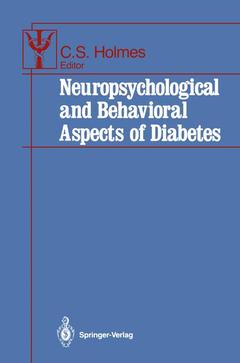Description
Neuropsychological and Behavioral Aspects of Diabetes, Softcover reprint of the original 1st ed. 1990
Contributions to Psychology and Medicine Series
Coordinator: Holmes Clarissa S.
Language: English
Subjects for Neuropsychological and Behavioral Aspects of Diabetes:
Publication date: 09-2011
283 p. · 15.5x23.5 cm · Paperback
283 p. · 15.5x23.5 cm · Paperback
Description
/li>Contents
/li>
Behavioral medicine has blossomed as an area of systematic investiga tion during the past 10-20 years. Throughout its steady growth, there have been increasing interest and specialization in the study of neuro psychological and behavioral aspects of diabetes. This book attempts to capture and report exciting new developments in the study of both insulin-dependent (Type I) and non-insulin-dependent (Type II) dia betes mellitus. Accordingly, it is divided into two major sections. Physiological aspects of each disease, which differ significantly in pathophysiology and course, are discussed in separate medical over views that introduce each major section. These overviews are written by Drs. Tsalikian and Zimmerman, leading medical researchers in insulin and non-insulin-dependent diabetes, respectively. Each section also contains chapters describing neuropsychological and cognitive disease correlates, psychosocial patterns of adjustment, and treatment adher ence issues. Psychological aspects of insulin-dependent diabetes have been studied more extensively than non-insulin-dependent diabetes, perhaps because it is more often associated with graver medical compli cations. Therefore, there is a larger body of research to review and the first section has been divided into chapters on cognitive disease se quelae in populations of children and adults, separately. In his chapter, Dr. Ryan discusses developmental factors related to the unique sensi tivity of the brain to metabolic derangement. Dr. Holmes reviews studies of adults with diabetes and the cognitive correlates of both acute and chronic blood glucose disruption. Developmental disease is sues are further covered in Dr.
Section I Insulin-Dependent Diabetes.- 1 Insulin-Dependent (Type I) Diabetes Mellitus: Medical Overview.- Etiology—Epidemiology.- Presentation—Management.- Hypoglycemia.- Complications of IDDM.- 2 Adaptation of Children to Newly Diagnosed Diabetes.- Psychosocial Adaptation.- Effects of Age at Diabetes Onset.- Treatment Studies.- Methodological Issues and Future Research.- Summary.- 3 Adherence Behaviors and Health Status in Childhood Diabetes.- Adherence and Health Status: Conceptual Issues.- Assessing Adherence.- Assessing Daily Diabetes Management by 24-Hour Recall Interview.- Adherence in Childhood Diabetes: Developmental Issues.- Adherence in Childhood Diabetes: A Unitary or Multidimensional Concept?.- Adherence/Health Status Relationships in Childhood Diabetes: Summary of Current Knowledge Base.- Methodological Issues and Guidelines for Future Research.- 4 Neuropsychological Consequences and Correlates of Diabetes in Childhood.- The Relationship Between Diabetes, Brain Dysfunction, and Psychosocial Disorders.- Early Studies of Cognitive Functioning in Diabetic Children.- Juvenile-Onset Diabetes and Neuropsychological Functioning: The Age at Onset Effect.- Other Risk Factors for Neuropsychological Dysfunction in Diabetic Children.- Juvenile-Onset Diabetes and Neuropsychological Dysfunction: Some Final Thoughts.- 5 Diabetes and Adaptations in Family Systems.- Why Study the Family’s Role in Insulin-Dependent Diabetes Mellitus (IDDM) and Non-Insulin- Dependent Diabetes (NIDDM)?.- Theories of the Family’s Role in Diabetes.- Research on Family Adaptation to Diabetes in Childhood and Adolescence.- Research on Family Adaptation to Diabetes in Adulthood.- Priorities for Future Research on Families and Diabetes.- 6 Eating Disorders and Diabetes.- Anorexia Nervosa and Bulimia Nervosa.- Subclinical Eating Disorders.- Eating Disorders and IDDM—Clinical Reports.- Prevalence of Eating Disorders in IDDM Patients.- Eating Disorders and Medical Consequences.- Subclinical Eating Problems in Patients with IDDM.- IDDM and Vulnerability to Eating Disorders.- Treatment of Eating Disorders.- Prevention of Eating Disorders.- Conclusion.- 7 Neuropsychological Sequelae of Acute and Chronic Blood Glucose Disruption in Adults with Insulin-Dependent Diabetes.- Transient Changes in Neuropsychological Function During Acute Blood Glucose Alteration.- Neuropsychological Effects of Chronic Glucose Alteration.- Implications and Directions for Further Research.- 8 Symptom Perception and Blood Glucose Feedback in the Self-Treatment of IDDM.- BG Feedback and Self-Treatment.- BG Symptoms.- Accuracy of Symptom Beliefs.- Ability to Recognize Hypoglycemia and Hyperglycemia.- Intervention to Improve BG Perception.- Summary and Future Directions.- Section II Non-Insulin-Dependent Diabetes.- 9 Non-Insulin-Dependent (Type II) Diabetes: Medical Overview.- Diagnosis and Classification.- Pathophysiology and Heredity.- Management Approach to the Patient.- Chronic Diabetic Complications.- Summary.- 10 Stress, Behavior, and the Autonomic Nervous System in Type II Diabetes Mellitus.- The Role of Stress in the Onset of Type II Diabetes Human Studies.- The Relationship Between Stress and Glycemic Control in Type II Diabetes.- Relaxation Therapy and Type II Diabetes.- Altered Adrenergic Sensitivity and Type II Diabetes.- Summary and Conclusions.- 11 Behavior Strategies for Improving Weight Loss in Obese Type II Diabetic Patients.- Obesity as a Risk Factor for the Development of Type II Diabetes.- Benefits of Weight Control.- Weight Loss and Mood.- Differences Between Diabetic and Nondiabetic Patients Participating in Weight Control Studies.- Overview of Early Studies on Dietary Interventions for Type II Diabetic Patients.- Behavioral Weight Control versus Nonbehavioral Treatments.- Exercise.- Self-Monitoring Blood Glucose.- Spouse Support.- Very Low Calorie Diet Regimen.- Predictors of Outcome.- Conclusion.- 12 Cognitive Function in Non-Insulin-Dependent Diabetes.- Methodological Considerations.- Cognitive Function in NIDDM.- Improving Performance through Choice.- Motivation and the Improvement in Performance.- NIDDM and Information Retrieval from Long-Term Memory.- NIDDM and Self-Reported Memory Problems.- Failures to Find NIDDM-Related Cognitive Deficits.- Cognitive Function and Metabolic Control in NIDDM.- Summary and Conclusion.- 13 Affective Disorders and Diabetes Mellitus.- Definitions of Affective Disorders.- Epidemiology of Affective Disorders and Diabetes Mellitus.- Mechanisms Underlying the Association of Diabetes and Depression: Why Do Diabetics Get Depressed?.- Mechanisms Underlying an Association between Mania and Depression.- Treatment Issues in Patients with Affective Disorder and DM.- Conclusion.
© 2024 LAVOISIER S.A.S.
These books may interest you

Insulin TherapyCurrent Concepts 45.82 €

Insulin Therapy Made Easy 41.95 €


